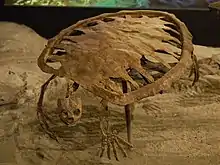Toxochelys
Toxochelys (/toʊxʌkɛliːz/) is an extinct genus of marine turtle from the Late Cretaceous period. It is the most commonly found fossilized turtle species in the Smoky Hill Chalk, in western Kansas.[1]
| Toxochelys Temporal range: Late Cretaceous | |
|---|---|
 | |
| Fossil specimen, Houston Museum of Natural Science | |
| Scientific classification | |
| Domain: | Eukaryota |
| Kingdom: | Animalia |
| Phylum: | Chordata |
| Class: | Reptilia |
| Order: | Testudines |
| Suborder: | Cryptodira |
| Clade: | Panchelonioidea (?) |
| Family: | †Toxochelyidae Baur, 1895 |
| Genus: | †Toxochelys Cope, 1873 |
| Species | |
| |
Description
Toxochelys had carapace about 48 centimetres (1.57 ft) in length.[2] Two species in the genus are recognized, Toxochelys latiremis and Toxochelys moorevillensis.[3] Phylogenetic analysis shows that Toxochelys belong to an extinct lineage of turtles transitional between modern sea turtles and other turtles.[4]
Toxochelys bauri Williston, 1905, based on the skeleton YPM 1786, is a synonym of Ctenochelys stenoporus.[5]
References
- www.oceansofkansas.com Retrieved on May 12, 2008
- Farina, Bruna M.; Godoy, Pedro L.; Benson, Roger B. J.; Langer, Max C.; Ferreira, Gabriel S. (2023). "Turtle body size evolution is determined by lineage‐specific specializations rather than global trends". Ecology and Evolution. 13 (6). doi:10.1002/ece3.10201. ISSN 2045-7758. PMC 10293707. PMID 37384241.
- Nicholls, E.L. 1988. New material of Toxochelys latiremis Cope, and a revision of the genus Toxochelys (Testudines, Chelonoidea). Journal of Vertebrate Paleontology, 8(2):181–187.
- Kear BP, Lee MS (March 2006). "A primitive protostegid from Australia and early sea turtle evolution". Biol. Lett. 2 (1): 116–9. doi:10.1098/rsbl.2005.0406. PMC 1617175. PMID 17148342.
- R. Zangerl. 1953. The vertebrate fauna of the Selma Formation of Alabama. Part IV. The turtles of the family Toxochelyidae. Fieldiana: Geology Memoirs 3(4):145–277.
- Cope, E. D. 1873. [On Toxochelys latiremis]. Proceedings of the Academy of Natural Sciences of Philadelphia 25:10.
- Hay, O. P. 1896. On the skeleton of Toxochelys latiremis. Publ. Field Columbian Museum, Zoological Ser. (later Fieldiana: Zoology), 1(5):101–106, pls. 14 &15.
- Case, E.C. 1898. Toxochelys. The University Geological Survey of Kansas, Part IV. 4:370–385. pls. 79–84.
- Hay, O.P. 1905. A revision of the species of the family of fossil turtles called Toxochelyidae, with descriptions of two new species of Toxochelys and a new species of Porthochelys. Bulletin of the American Museum of Natural History 21(10):177–185.
- Druckenmiller, P. S., A. J. Daun, J. L. Skulan and J. C. Pladziewicz. 1993. Stomach contents in the upper Cretaceous shark Squalicorax falcatus. Journal of Vertebrate Paleontology. 13(supplement. to no. 3):33A.
- Carrino, M.H. 2007. Taxonomic comparison and stratigraphic distribution of Toxochelys (Testudines: Cheloniidae) of South Dakota. pp. 111–132 in Martin, J.E. and Parris D.C. (eds.), The Geology and Paleontology of the Late Cretaceous Marine Deposits of the Dakotas. Geological Society of America, Special Paper 427.
- Konuki, R. 2008. Biostratigraphy of sea turtles and possible bite marks on a Toxochelys (Testudine, Chelonioidea) from the Niobrara Formation (Late Santonian), Logan County, Kansas and paleoecological implications for predator–prey relationships among large marine vertebrates. Unpublished Masters thesis, Fort Hays State University, Hays, Kansas, 141 pp, Appen. I-VI.
- Matzke, A.T. 2008. A juvenile Toxochelys latiremis (Testudines, Cheloniidae) from the Upper Cretaceous Niobrara Formation of Kansas, USA. Neues Jahrbuch für Geologie und Paläontologie. Abhandlungen 249(3):371–380.
- Matzke, A.T. 2009. Osteology of the skull of Toxochelys (Testudines, Chelonioidea) (with 25 text-figures). Palaeontographica Abteilung A 288(4):93–150.
This article is issued from Wikipedia. The text is licensed under Creative Commons - Attribution - Sharealike. Additional terms may apply for the media files.